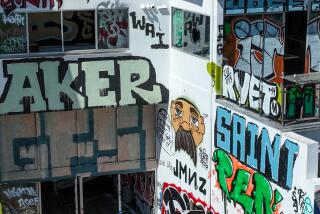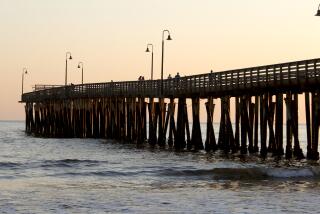Paint Doesn’t Curb His
- Share via
Desire for Publicity
Roger Boesky, a commercial real estate developer, doesn’t believe in asking the government for favors.
Rather than plead with City Hall to redress the parking problems outside his SeaCoast Square shopping center, at Garnet Avenue and Mission Boulevard in Pacific Beach, Boesky did it himself.
He ordered the curb along Garnet painted white. White designates a passenger loading zone, where parking is limited to three minutes, which would discourage all-day beach-goers from tying up the spots.
Every little bit helps, Boesky figured.
Finding a parking space in Pacific Beach, particularly one near Crystal Pier, is about as easy as finding a beachfront home in La Jolla for $75,000.
Boesky notified the city of his work. He insists the curb was white when he bought the building in 1983, but the color had since faded.
The Engineering and Development Department could find no record of ever authorizing that side of Garnet and Mission as a white zone. It sent an inspector to inspect. It sent a letter to Boesky.
“We try to discourage free-lance curb painting,” said supervisor Craig Tennesen. Among other things, it confuses the meter maids.
Still, the city takes a patient, almost parental, attitude toward people who paint their own curbs. Often, the city ends up painting the curb the same color.
One solution, said city traffic engineer Massoud Sammak, would be to paint two spaces white and sandblast the two others back to their native gray. If so, Boesky will be billed $100.
Boesky, a second cousin to fallen financier Ivan Boesky, can live with that. He gets half a loaf of parking and something even more precious: publicity.
“Do you have any idea how hard it is to get some public relations for a shopping center?” he asked. “I have another building in Del Mar. If I paint the curb there, can I get a story out of that, too?”
Sorry, I’m checking out the red-zone artists of Clairemont.
As the Worm Turns
If you have a lemon, make lemonade. And if you have earthworm castings, make fertilizer.
The Fallbrook Sanitary District wants to make a buck from the droppings left by the worms that nibble at sludge created during waste-water treatment. But first it needs a catchy name.
So it held a contest and attracted 150 entries. Four persons submitted the same name and will now split 3 cubic yards of fertilizer.
The winning name: Fallbrook Vermigro. That’s vermi (worms) and gro (fertilizer).
Among the losing entries: Vertigro, Castings of Thousands, Vermix, Vermiverde, Vermade, Wormade, Sludge Fudge, Fertilverm, Brown Poopon and more.
“A few others were descriptive but perhaps a bit inappropriate,” General Manager Ben Price said.
Windows Into History
Update: Arnold Hunsberger is willing to help the new owners of the El Cortez Hotel in downtown San Diego rehabilitate the outside glass elevator.
For unknown reasons, it had lapsed into local legend that the elevator, the first such in the country, had been built by a now-defunct German firm.
That’s what the owners told the city’s Historical Site Board in explaining why plans to renovate and reopen the 61-year-old landmark did not include fixing up the elevator.
The truth, said Hunsberger, is that the elevator was built in 1955 by a San Diego firm called Elevator Electric that he owned with two partners. The three went on to build 1,000 glass elevators.
The Historical Site Board, which is reluctant to approve the renovation unless the elevator is included, is set to discuss the Cortez again in August.
Representatives of hotelier Mark Grosvenor are interested in talking to Hunsberger, now 62 and semi-retired.
All he’s doing these days is building a glass-and-steel home in Dulzura, complete with co-generation plant, and working as the hands-on president of Tech-Matic of San Diego, involved in robotics and computerization of machine tooling.
More to Read
Sign up for Essential California
The most important California stories and recommendations in your inbox every morning.
You may occasionally receive promotional content from the Los Angeles Times.













